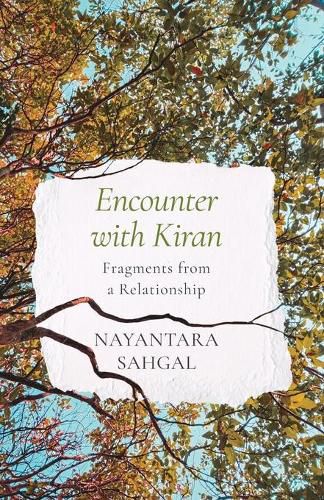Readings Newsletter
Become a Readings Member to make your shopping experience even easier.
Sign in or sign up for free!
You’re not far away from qualifying for FREE standard shipping within Australia
You’ve qualified for FREE standard shipping within Australia
The cart is loading…






This title is printed to order. This book may have been self-published. If so, we cannot guarantee the quality of the content. In the main most books will have gone through the editing process however some may not. We therefore suggest that you be aware of this before ordering this book. If in doubt check either the author or publisher’s details as we are unable to accept any returns unless they are faulty. Please contact us if you have any questions.
Description
When they first met in 2002 at a literary festival, Nayantara Sahgal was a veteran
of more than twenty books; her debut work, the memoir Prison and Chocolate
Cake, was published in 1954. Kiran Nagarkar had published his first novel, Saat
Sakkam Trechalis, in Marathi in 1974, and his first work in English, Ravan and
Eddie, twenty years later. Sparks didn’t fly at that first encounter. It was only in
2014, when Nagarkar wrote to Sahgal about Mistaken Identity and other books of
hers that he had read, that she invited him to lunch at her home in Dehradun-
and thus began a correspondence that lasted until Nagarkar’s death in 2019.
As they discussed each other’s work, their almost daily exchange of emails grew
into a sharing of concerns: Nagarkar’s chronic ill-health, Sahgal’s grief on the death
of her 23-year-old grandson, Zum, and through it all, their distress at the rise of
violent majoritarianism and the loss of democratic ideals in their beloved country.
Emails don’t, observes Sahgal, ‘have the prestige of letters, but they have
an immediacy that letters can’t have. Our mails made for the sense of a
presence nearby with whom it became natural to share views, feelings and
daily doings’. United by their love of books and their politics, separated by
distance-Nagarkar in Mumbai, Sahgal in Dehradun-this immediacy was
the key to a friendship that remains an enigma to an outsider. For Sahgal, the
emotions appear to be those of a friend, albeit a close and loving one. For
Nagarkar, 72 to Sahgal’s 87 when the correspondence began, the feelings run
deeper; he misses her constantly, and proclaims his love.
This collection of mails is a rare and poignant document, an intimate glimpse
into the life and times of two extraordinary writers who drew strength from
each other in their personal and political battles.
$9.00 standard shipping within Australia
FREE standard shipping within Australia for orders over $100.00
Express & International shipping calculated at checkout
This title is printed to order. This book may have been self-published. If so, we cannot guarantee the quality of the content. In the main most books will have gone through the editing process however some may not. We therefore suggest that you be aware of this before ordering this book. If in doubt check either the author or publisher’s details as we are unable to accept any returns unless they are faulty. Please contact us if you have any questions.
Description
When they first met in 2002 at a literary festival, Nayantara Sahgal was a veteran
of more than twenty books; her debut work, the memoir Prison and Chocolate
Cake, was published in 1954. Kiran Nagarkar had published his first novel, Saat
Sakkam Trechalis, in Marathi in 1974, and his first work in English, Ravan and
Eddie, twenty years later. Sparks didn’t fly at that first encounter. It was only in
2014, when Nagarkar wrote to Sahgal about Mistaken Identity and other books of
hers that he had read, that she invited him to lunch at her home in Dehradun-
and thus began a correspondence that lasted until Nagarkar’s death in 2019.
As they discussed each other’s work, their almost daily exchange of emails grew
into a sharing of concerns: Nagarkar’s chronic ill-health, Sahgal’s grief on the death
of her 23-year-old grandson, Zum, and through it all, their distress at the rise of
violent majoritarianism and the loss of democratic ideals in their beloved country.
Emails don’t, observes Sahgal, ‘have the prestige of letters, but they have
an immediacy that letters can’t have. Our mails made for the sense of a
presence nearby with whom it became natural to share views, feelings and
daily doings’. United by their love of books and their politics, separated by
distance-Nagarkar in Mumbai, Sahgal in Dehradun-this immediacy was
the key to a friendship that remains an enigma to an outsider. For Sahgal, the
emotions appear to be those of a friend, albeit a close and loving one. For
Nagarkar, 72 to Sahgal’s 87 when the correspondence began, the feelings run
deeper; he misses her constantly, and proclaims his love.
This collection of mails is a rare and poignant document, an intimate glimpse
into the life and times of two extraordinary writers who drew strength from
each other in their personal and political battles.